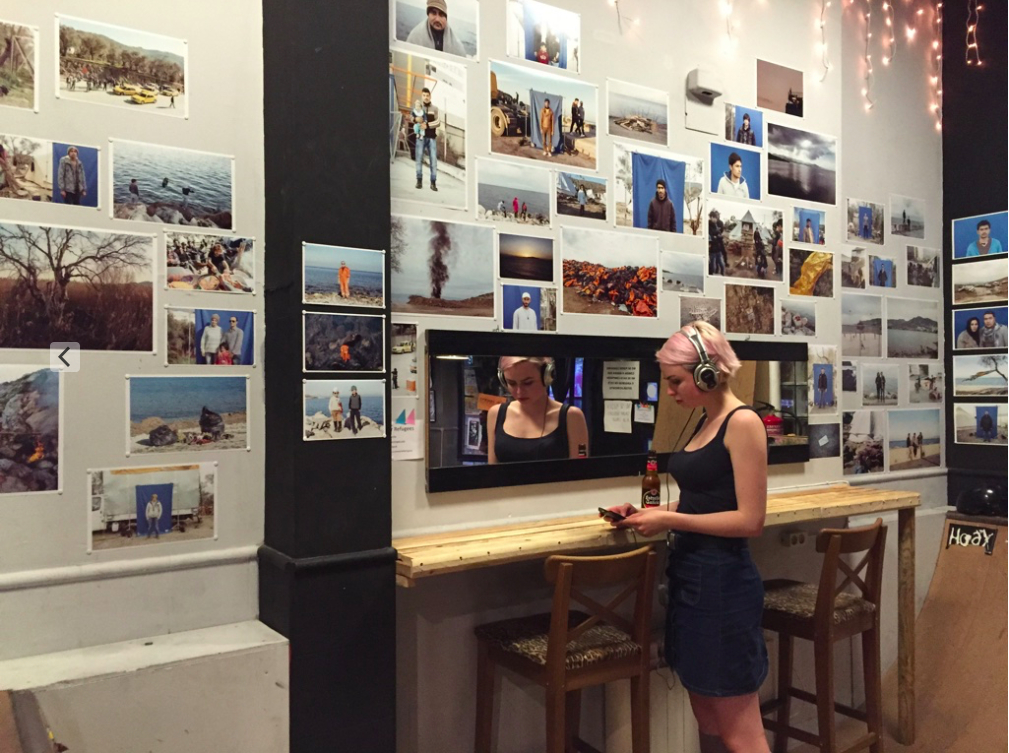By Noah Wanebo
Sitting in the Aegean Sea, just six miles from the coast of Turkey, the Greek island of Lesbos has become the epicentre of the current refugee crisis in Europe. Hundreds of thousands of asylum seekers have already streamed across the island throughout the past year, making their way to the European mainland from war-torn Syria and other conflict areas in the Middle East and beyond. Many more now sit stranded in temporary camps as political backlash and shifting EU policies threaten to seal off the popular route.
Photographer Ben Roberts visited Lesbos in late February while on assignment with the United Nations, where he captured the chaos, fear, and hope in a stunning series of photographs titled ‘Stepping Stone.’ The collection, displayed over the past month in the Old School Skaterock Bar in Madrid, powerfully combines portraiture, landscapes, and the imagery of day-to-day life into a sweeping snapshot of an island thrown into disarray by this humanitarian crisis of global proportions.

The sounds of burning boats, crashing waves, and the clanking of sheep bells as a herd passes through a cemetery of life-vests were some of the ambient noises recorded by field journalist Phillip Wonzy, who joined Roberts on assignment to Lesbos to collect refugee interviews. Attendees could listen to the soundscapes with headphones at the photo exhibition.
Though the original UN project remains on indefinite hiatus, Roberts and Wozny decided to display their work locally to help bring attention to urgency of the situation, and to reaffirm the human element so often lost in media coverage of the crisis.
The photo exhibition culminated with a donation drive on May 4th, the proceeds of which were generously donated to Madrid For Refugees (MFR) with the aim of providing sports and leisure equipment for refugees in the community.
‘The exhibition and print donation drive gave Phil and I the opportunity to do something constructive at a local level,’ wrote Roberts in an email. ‘When we spoke to the refugees in Lesbos, many of them had ideas of where they hoped to end their journeys, but often these plans weren’t fixed. Arriving into a foreign city with no family or friends is difficult, and the work that small local organisations do in cities throughout Europe is really important but often goes unrecognised. Smaller organisations are good at reaching people directly in your own community.’


At the donation drive, attendees were able to make a donation of any amount and take home whichever print they liked the most. Bana Shehadeh, a Syrian living in Madrid, decided on a photo of a mylar blanket snagged on a tree branch, blowing in the wind over the seaside.
‘We chose that photo because it was symbolic,’ said Shehadeh. ‘This idea that when people arrive they are really cold – not just cold because they’ve been in the sea, but because they’ve left the country. We’re living with this feeling every day, this feeling of being an orphan.’
The soundscape recordings accompanying the powerful images added another layer of immersion to the viewing experience. As Wozny explained, these types of sounds can have a transportive effect.
‘The listener can place themselves in that context,’ Wozny said. ‘Unlike portraiture, the subject is the context itself rather than any isolated element. It’s sort of democratising as you, the listener in Madrid, can hear the same sea as the refugees waiting for the ferry and the NGOs handing out food.’
Attendees had the opportunity to talk with Roberts and Wozny about their firsthand experiences on the island, as well as speak with MFR representatives about ways to get involved locally. The event ended with a short presentation by Roberts, who explained the work and its intended local impact, as well as a brief explanation of MFR and its projects by MFR president Christina Samson.

Donations from the event came to just over €150, and will be used by Madrid For Refugees to help fund a small children’s pool at one of the local refugee centres, as well as weightlifting equipment for the adults.
If there were one unifying theme for the night, it was the emphasis on the human element of the crisis.
‘What we aimed to do was to give a human face and story to an all-too-often dehumanised demographic,’ said Wozny.
Bana Shehadeh saw an allegory of that same issue in one of Robert’s photos, in which thousands of fake orange life vests sit discarded in a pile on the island.
‘It’s thousands of vests, thousands of people who died or who arrived,’ she said. ‘People are becoming numbers, people are becoming these life vests, people are becoming shoes … and then nobody cares.’


About the author: Originally from Boulder, Colorado, Noah moved to Madrid to teach English in 2011 and immediately fell in love with the energy and spirit of the Spanish capital. When the refugee crisis erupted in the summer of 2015, he formed part of the wave of support among foreigners and locals alike looking to help Madrid live up to its reputation as a warm-hearted, open, and welcoming city for everyone. Noah is the Vice President of Events for Madrid for Refugees: events@madridforrefugees.org,



Pingback: Una mirada retrospectiva al primer año de Madrid For Refugees - MadridForRefugees
Pingback: Looking back at the first year of Madrid For Refugees - MadridForRefugees